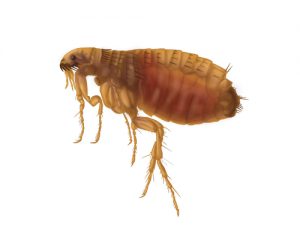Pre-Vacation Flea Planning – Advice From the Pros
By Chris Williams on June 1, 2011.
If you’re planning a vacation soon and you’ve had recent problems with fleas in your home, you should consider having a flea treatment done before you leave. Families returning home from vacation are sometimes met by spectacular flea outbreaks. The reason? The ability of pre-emerged adult fleas to lie dormant.
 When the female flea lays her eggs (up to 20 per day), they drop off of your pet—usually ending up in pet resting areas. A few days later the eggs hatch into wiggly, wormlike flea larvae. The larvae feed on dried blood, skin flakes and other organic debris for a week or more. Then they pupate. Once the adult flea has fully developed inside the pupal cocoon, it can remain in a kind of “limbo” for a long time if there is no animal to feed on. The flea patiently waits inside its pupal cocoon until it detects heat, pressure, or carbon dioxide—meaning a potential blood source is near.
When the female flea lays her eggs (up to 20 per day), they drop off of your pet—usually ending up in pet resting areas. A few days later the eggs hatch into wiggly, wormlike flea larvae. The larvae feed on dried blood, skin flakes and other organic debris for a week or more. Then they pupate. Once the adult flea has fully developed inside the pupal cocoon, it can remain in a kind of “limbo” for a long time if there is no animal to feed on. The flea patiently waits inside its pupal cocoon until it detects heat, pressure, or carbon dioxide—meaning a potential blood source is near.
When you go on vacation, you either board the pets or take them with you. In either case, the house is empty of pets and people. Flea eggs continue to hatch and fleas continue to develop while you’re on vacation but there is nothing for them to feed on. Depending on the length of your vacation, an amazing number of fleas can be waiting for your return. Pest control companies frequently get calls from families who returned home from vacation happy and relaxed, only to be attacked by a horde of hungry fleas as soon as they opened the door. Fleas aren’t picky eaters. When they’re hungry, they’ll feed on people as well as pets.
Add Colonial Pest Control to your pre-vacation check list. Call us to schedule a flea treatment before you leave, or to schedule one while you’re gone. It’ll be one less thing to worry about.